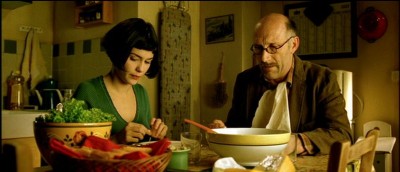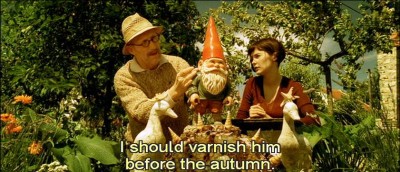
Perhaps because it was the Fine Arts’ big Christmas movie back in 2001, or maybe just because it has a largely red and green color scheme, or possibly just because it’s such a special treat, Amélie has always seemed like a Christmas picture to me, but it really isn’t. (Then again that Christmas perennial, the 1934 Laurel and Hardy Babes in Toyland is actually set in July.) For those of you who don’t know, Amélie is the fantasticated story of Amélie Poulain (Audrey Tautou in the role that brought her to the attention of the world), a strange and fanciful girl from an even stranger family. Amélie lives her life on impulses — mostly impulses to do good (and liking herself to the point of sainthood for it), but sometimes impulses to mete out justice in decidedly quirky and elaborate ways. She solves mysteries, she creates mysteries and she is something of a mystery, since her own life never really seems to have started. Amélie is at the center of Jean-Pierre Jeunet’s wonderfully playful film, but perhaps the real star is the filmmaking itself. If you’re only familiar with Jeunet’s early works like Delicatessen (1991) and City of Lost Children (1995), Amélie is something of those films’ opposite. Where those were dark fantasies with glimmerings of light, this is a light fantasy with some intriguingly dark edges.
Below is the review from 2001:

Returning to France after the mixed blessing of helming a big-budget Hollywood film, Alien Resurrection, Jean-Pierre Jeunet disproves Thomas Wolfe’s adage that you can’t go home again. Not only did he go home, but once there he made his best film yet: the utterly captivating Amélie (Le Fabuleux Destin d’Amélie Poulain), an instant classic and the sort of magical work that reminds us how truly fine movies at their best can be. And the film comes to Asheville just in time for Christmas — apt timing, considering Amélie‘s gorgeous red-and-green production design. It’s just about the best cinematic Christmas present we could hope for. As the original French title suggests, the film concerns the fabulous destiny of Amélie Poulain, but just as fabulous as her destiny is the film itself.

It doesn’t happen too often that a movie comes along in which style and substance are as perfectly mated as they are here within the simple — but not simplistic — confines of its story of a young woman, Amélie (Audrey Tautou), who accidentally discovers a child’s box of treasures hidden 40 years earlier in the apartment she inhabits. She sets out to return the box to its owner, launching herself on a career of quirky good deeds. It would actually be impossible to imagine anything but quirky good deeds from a character like Amélie, who is herself the perfect embodiment of quirky. A lonely child whose mother died in a suicide leap from Notre Dame (that statement tells you less than you think it does) and whose doctor father was so distant that his touch during physical examinations caused her heart to beat faster (and caused him to misdiagnose her with a heart defect), Amélie is a character who can — and will — believe in almost anything that appeals to her, regardless of how fanciful. And she’s utterly enchanting, especially as played by Tautou.

Anyone familiar with Jeunet’s previous work will find Amélie far more like Delicatessen and City of Lost Children than Alien Resurrection, but that assessment is somewhat misleading. While cinematically playful in much the same manner as Amélie, those films had much darker edges, focusing on decaying worlds that were recognizable as fantasticated extensions of our world at its worst.Amelie, on the other hand, presents a similarly fantasticated extension of our world, but this time at its best. This has actually caused the film some grief in a few critical corners, since it makes the film insufficiently “serious.” That attitude is nonsensical in the extreme, unless you subscribe to the theory that, in order for a thing to be art, it has to be a kind of intellectual “nasty medicine.” Unless you’re completely mired in that mindset, I can’t imagine you not succumbing to the delights of this remarkable film.

It’s a magnificent package of cinematic invention and a never-ending barrage of surprises (none of which I’m prepared to give away) in both style and story. Some of it may feel vaguely familiar. There’s a humorously sweet sex scene that’s reminiscent of one in Delicatessen, and much about the plot has the optimism of an old-style Hollywood movie. (That’s not entirely surprising, since the sex scene in Delicatessen was itself drawn from the famous opening of the old Rouben Mamoulian Maurice Chevalier musical, Love Me Tonight, and in fact the sheet music for one of the songs in that film, “Mimi,” hangs on the wall of Amélie’s flat.) Yes, Amélie is a souffle of a movie. It has no burning message to deliver. What it does have is perhaps more important: It has joy, it has a heart, it has imagination, it has a sense of humor about life. It is alive with the possibilities of film and the possibilities of life and its surprises. If there’s a better movie this holiday season, it will have to be a very remarkable work indeed. Amelie is a true “must-see.”
The Asheville Film Society will screen Amélie Tuesday, Dec. 3, at 8 p.m. in Theater Six at The Carolina Asheville and will be hosted by Xpress movie critics Ken Hanke and Justin Souther.



Before you comment
The comments section is here to provide a platform for civil dialogue on the issues we face together as a local community. Xpress is committed to offering this platform for all voices, but when the tone of the discussion gets nasty or strays off topic, we believe many people choose not to participate. Xpress editors are determined to moderate comments to ensure a constructive interchange is maintained. All comments judged not to be in keeping with the spirit of civil discourse will be removed and repeat violators will be banned. See here for our terms of service. Thank you for being part of this effort to promote respectful discussion.